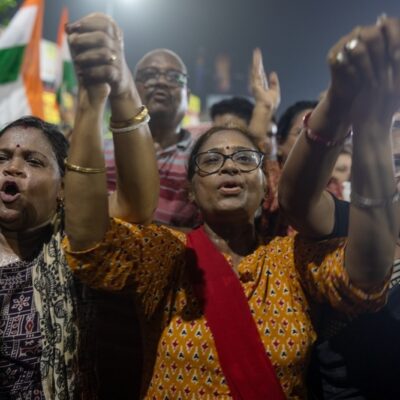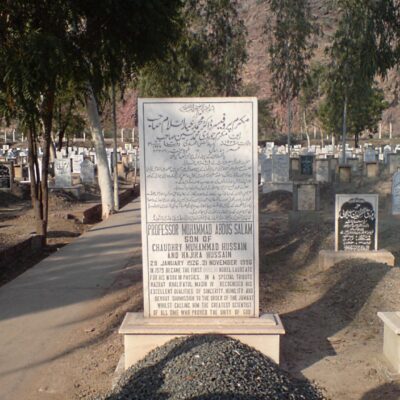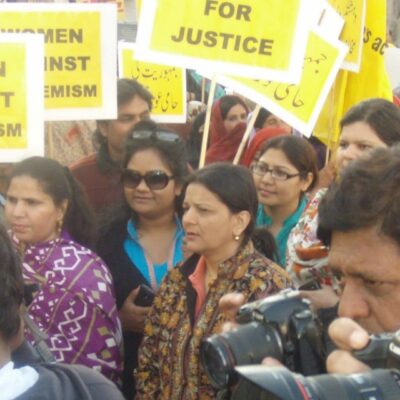I argue that to understand securitisation of Muslims in India (and beyond) by limiting it within the frame of the attacks on the USA on September 9, 2001 (9/11) and the ‘Global War on Terror’ is to succumb to journalistic presentism, which is also largely securitised. A historically grounded understanding ought to instead situate securitisation of Muslims as simultaneous with colonial modernisation and the development of nationalism and nation-states. To proceed then with my argument that securitisation, modernisation and nation-statisation together form a coeval trinity, let’s begin with the phrase ‘securitisation of Islam.’
Political scientist Jocelyne Cesari claims to have coined this phrase and marks its onset with post-9/11 policy by European states: ‘a paradoxical policy of European governments both fearing and fostering radicalisation in a process I call the ‘securitisation’ of Islam.’ What this quote reveals, inter alia, is that while Cesari takes securitisation as contested to place it in scare quotes, she does not take a similar stance with the words radicalisation or radical/radicalism, which she also often uses. This suggests that unlike securitisation, radicalisation and its kins are supposedly neutral.
In my own work, I name the process Muslims were put to as follows: ‘In the post–9/11 world, as Islam has become an object of ‘security,’ these terms have also become ‘securitised.’’ Those terms were ‘moderation’ and ‘radicalisation, both in scare quotes.
My point is not so much whose phrase it is but which horizon of thought it springs from as well as ushers in. As it has been noted, far from being neutral, radicalisation is a politicised term such that it has been made nearly coterminous with Islam and Muslims. Radical, in fact, signifies the enemy in the international political order instituted after World War II, especially during ‘the New World Order.’ When used along with ‘fanatic,’ as is often the case, it becomes deadlier. From the early nineteenth century on, Jews and Muslims occupied the space of fanatics, as an enemy in Western/Christian thought. Contemporaneously, Muslims, with or without the prefix radical, mostly occupy that space. Thus viewed, it becomes clear how an attempt to coin the phrase, securitisation of Islam, is itself indebted to the vocabulary instituted by Western states and embraced by compliant non-Western powers such as India.
For example, in 2006, the British state launched a gigantic academic ‘research’ project: ‘Combating Terrorism by Countering Radicalisation.’ Disregarding their autonomy, it asked academics to study pre-designed topics such as ‘membership of extremist Islamist groups,’ ‘theological legitimisation for violence,’ ‘name the key figures (moderate and extreme)’ and ‘radicalisation drivers.’ Since the project (that covered virtually the whole world divided into six zones) named no other group but only Muslim, the government had no ambiguity about who the target was. Put differently, to coin securitisation of Islam by placing it in scare quotes but not similarly treat ‘radicalisation’—a post-9/11 ‘buzzword in intelligence circles’—is akin to participating in the discourse of radicalisation bequeathed by Western powers.
A recent study explains securitisation of Muslims more theoretically as Western states’ turn to ‘militant democracy.’ After Hitler’s violent rise to power through democracy, the key concern of Karl Loewenstein, an émigré German political thinker to the US, was to halt Nazism based on ‘intimidation and terrorization scientifically applied.’ And, should democracy with values of ‘fundamental rights, for fair play for all opinions, for free speech, assembly, press,’ therefore, allow space to fascism? By militant democracy, Loewenstein meant banning fascist organisations from democratic space. Based on interviews with 23 Muslims in Australia, the authors of this study see securitisation as resulting from Australia’s turn to Loewenstein’s militant democracy. To this political science term, they apply anthropologist Ghassan Hage’s concept of ‘misinterpellation,’ an obverse borrowing from the philosopher Louis Althusser’s ‘interpellation.’ Misinterpellation as subjectivity of Muslims interviewed in this study thus works as a conceptual subsidiary to their securitisation presided over by Australia’s turn to militant democracy.
While the move to theoretically unpack securitisation is worthy, the theory itself seems less so. Is it correct to equate, as the authors’ unsullied application of militant democracy to the post-9/11 condition assumes, fascism with what they take as ‘Islamic extremism?’ Notably, they don’t spell out the rationale of this equation. Though, unlike Cesari, they use radicalisation only once, its meaning is similar to Islamic extremism. Thus, they discuss Muslims in relation to their religious identity, hijāb, the Qur’ān and religious texts. In fact, they treat Islamic extremism as ‘ideological.’ Along with the inapt equivalence between fascism and Islamic extremism, my second critique is that they also appear to misread Loewenstein’s take on fascism. To Loewenstein, ‘fascism is not an ideology but a political technique.’ The equivalence between fascism and ‘Islamic extremism’ thus does not hold, as it equalises what to Loewenstein is a technique with what the authors take as an ideology. That they write ‘Muslim terrorists’ as an innocent label and, like Cesari’s use of radicalisation, without scare quotes is no less strange. What about Hage’s ‘misinterpellation?’ As noted earlier, it is a subsidiary to militant democracy as a core concept. When the core loses its coherence and comparative merit, as the discussion so far demonstrates, misinterpellation too logically falls apart. Here, it is vital to note that, in 2020, Hage explicitly stated the unproven equation the study I discuss here assumes throughout. He termed the ghastly attack in Nice, France as an ‘Islamo-fascist terrorist attack.’ Like the term radicalisation common to both Cesari and the British counterterrorism research agenda, ‘Islamo-fascism’ is shared alike by Hage and George Bush Jr. who used it long before the former did.
Security: The very word and its meanings
The first step toward developing an alternative framework is to examine the premise of 9/11 as a benchmark for securitisation of Islam—a premise, which, like Cesari and others, I too once subscribed to, albeit differently. To this end, my emphasis on temporality is not simply calendrical but conceptual. That is, to understand securitisation of Islam is to get to the very concept of security.
In academic and writer Raymond Williams’ sense of keywords, security has traditionally been at the heart of Political Science and International Relations (IR) rather than anthropology or sociology, which only relatively recently began to engage with it. According to John Baylis, an IR expert, security is a ‘contested’ but foundational term in IR where it primarily means security of the state. As an academic discipline begun after WWI, IR’s key theory then was Idealism, which briefly enjoyed support due to optimism of the League of Nations (the precursor to the United Nations). However, soon Idealism gave way to Realism, the most dominant IR ‘theory,’ Hans Morgenthau being its founder. Drawing on Thucydides, Niccolò Machiavelli, Thomas Hobbes and others, Realism believes in no morality except that of raison d’État (reason of state). Consequently, survival and security of the state require its relentless strengthening vis-à-vis its enemies. Political theorist Carl Schmitt, who took politics as differentiating friend from foe, deeply influenced Morgenthau. Realism ruled the field of IR after 1945 and during the Cold War, at the end of which Idealism briefly resurfaced. After 9/11, it was ‘back to realism’ again.
In the 1980s and later, an important development in IR theory was also the onset of the constructivist approach, which challenged positivist premises of Realism and Neo-Realism. Here the contribution of feminist scholarship is pivotal. For constructivists, security is not natural or given; hence, their emphasis on the constructed nature of securitisation. Scholars critical of the hegemonic Realist notion of security are deemed to belong to the Copenhagen or Welsh school. A parallel development occurred in the form of ideas about human security and development to which, among others, economists Mahbubul Haq and Amartya Sen contributed significantly.
The discussion so far thus enables us to identify three meanings and usages of security:
- security of a (national) state or its allies under threat by one or more states,
- securitisation as a process that fashions rather than simply reflects a threat ‘out there’ and;
- in its wider usage, security is not limited to the state but it also pertains to economy, health, environment and more.
Below, I demonstrate how Islam and Muslims in India have been a key object of securitisation in all these three meanings, well before 9/11. To fulfil this task, some notes are in order.
The three usages of security are distinct only heuristically; in practice they overlap. Thus, the first meaning—expressed mainly as ‘national security’ in military terms—continues to shape the tenor of the second as well as the third one. While my argument is sympathetic to the constructivist approach, its specific rendition in the Copenhagen school and elsewhere is deeply problematic. It is not simply the case that the premises of securitisation theory are Eurocentric; they equally rest on ‘methodological whiteness and anti-black racism.’
Notably, securitisation theory, like IR, too remained oblivious to religion. After 9/11, when it addressed religion, Carsten Laustsen and Ole Wæver, for example, considered it mostly from a Eurocentric-Christian lens. They disregarded the probing critique of dominant studies of religion by scholars like Talal Asad, or even by Elizabeth Hurd, an IR scholar. Their analysis assumes a ‘good’ secular West and a ‘bad’ religious East, especially the Islamic one. Furthermore, the received wisdom that surgically separates national from international or ‘home’ from abroad is unhelpful. This separation, for example, cannot account for international simultaneity of the post-9/11 discourse of ‘Not all Muslims are terrorists but all terrorists are Muslims’ in as different and distant nation-states as Australia, India, Norway and the US.
Securitising Muslims/Islam in India: A long view
No doubt, 9/11 intensified the securitisation of India’s Muslims—a new anti-terrorism law being its chief tool. That the anti-terror law, The Prevention of Terrorism Act (POTA 2002), disproportionally and non-evidentially targeted Muslims is apparent from the fact that from its enactment until September 2006, over 3,500 people (including some minors) in 18 states were held under POTA. The state of Gujarat had the largest number of detainees, 287, of whom all, except one, were Muslim.

A ‘public conference’ organised by Inṣāf Manch (Justice Front) on 7 Dec 2013, in Muzaffarpur, North Bihar, India. The goal was to get justice against ‘the anti-democratic and repressive actions of the NIA [National Investigation Agency]’ and demand ‘the immediate release of the innocent Muslim youth of Bihar arrested in the name of terrorism.’ Credit: Author.
In the absence of credible post-2006 data about terrorists killed in ‘encounters’ or put in jail, suffice to note that many bright Muslim student activists and research scholars resisting the Islamophobic policies of the current regime have been jailed on predominantly fabricated charges of terrorism or as threat to national security. Among them are Meeran Haider, Safoora Zargar, Sharejeel Imam and Marxist Umar Khalid. The videotaped lynching of Muslims in daylight on the allegation of consuming or storing beef or ‘cow smuggling/slaughter’—that in a so-called secular state, as India projects itself to the West, citizens have the right to choose their diet is not even mentioned—is another grotesque face of securitisation of Muslims. Beef as a threat to the health security of the Hindu nation-sate and the consequent lynching of Muslims is unique to India.
In the first sense of security stated above, the earliest example of securitisation of Muslims is bound up with the very birth of India as a republic. And the securitising actor (a phrase central to securitisation theory) was, hold your breath, M. K. Gandhi, the so-called icon of non-violence and ‘spiritual’ politics! In 1948, a Hindu asked Gandhi if ‘any Muslim can be our brother or be loyal to the Indian Union’ in case of a war against Pakistan. Gandhi chillingly replied:
‘Do I imagine that the several crores [1 crore = 10 million] of Muslims in India will be loyal to India and fight against Pakistan? …we must not assume anyone to be bad till he has been proven to be bad…If later they [Muslims] betray you, you can shoot them. You may shoot one or two or a certain number. Everyone will not be disloyal…We must be brave and trust the Muslims. If later they violate the trust you can cut off their heads’ [italics added].
To understand the process of securitising Muslims, Gandhi’s statement made only months after India’s independence from British rule is significant on many counts. To begin with, he took Muslims as a threat to the security of the Indian state or the Indian Union. Here, Gandhi’s meaning of security is realist (as in IR) in its elementary sense. What concerned him, moreover, was not loyalty to values or principles but to the very leviathan as a brute entity. More importantly, to deal with the hypothetical ‘threat’ as a war, he asked the Hindu questioner, and by implication the audience whom he was explaining the question to, to take law into his own hands rather than put ‘disloyal’ Muslims on trial in a court. The lynching of Muslims in contemporary India, then, is not a deviation from Gandhi’s advice to the Hindu discussed here. Astonishingly, it simply escaped Gandhi that Hindus too could be disloyal to India.
This depiction of Indian Muslims as disloyal to India in a war between India and Pakistan—so far, the two countries have fought four wars in 1948, 1965, 1971 and 1999—stems from the premise of Muslims and Islam as outsiders to India. As it is well known, for a thing to be classified as a security threat, it needs to be vilified as the other and outsider. This premise in Gandhi’s response, however, is not entirely his own. It precedes him by nearly two centuries. The portrayal of Muslims and Islam as outsiders to India was at the heart of Western Orientalism, the intellectual arm of colonialism coeval with modernity. Much of Islamophobia in contemporary India and acts of Muslims’ securitisation is thus historically borrowed (and, obviously, also recast) from that very Orientalist archive. Securitisation in its second usage is thus older and significantly different from the ways in which the Copenhagen school and others largely see it.
Contra the advocates of securitisation theory, securitisation of Muslims in India is an upshot of modernisation, itself enmeshed in religion. Gandhi’s 1948 statement simply translated modernity and orientalism into a nation-state project. His premise of externalisation and otherisation of Muslims emanates straightforwardly from British Orientalism. British soldier-writer William Watts who had participated in the 1757 War against the Indian king was the first to externalise/otherise Muslims in order to justify colonialism.
The British manufactured the myth that Muslims were the first outsiders to rule India, not the British. Emboldened by such propaganda, Rammohun Roy (d. 1833), the so-called father of the Indian Renaissance and India’s ‘first’ liberal, welcomed colonialism as freedom from ‘Mohammadan Rule’ over Hindus who he fictionalised as ‘the original inhabitants.’ It is only from this long historical view that we can understand securitisation of Muslims by India’s Prime Minister, Narendra Modi, when, in 2014, he dubbed Muslims as outsiders and the period of rule by them as ‘1200 years of servitude, ghulamī.’ Modi’s condemnation of ‘pink revolution’ follows the same politics of enmity, indirectly also inciting anti-Muslim lynching in the name of ‘cow-protection.’ As the color of cow meat is pink, ‘pink revolution’ refers to Muslims eating beef, which to believing Hindus is a blasphemy because they take cows as religiously sacred.
The current securitisation of Muslims is evident in many other phrases such as ‘land jihad,’ ‘love jihad’ and ‘marks jihad’. Consider the fiction of love jihad, which tells the public that Muslims receive foreign funding to lure Hindu girls and women and marry them. This myth serves the dual purpose of maintaining Hindus’ religious purity and creating the fear of Muslims demographically outnumbering Hindus. Such a concern about Hindu girls and women, however, resonates perfectly with Mein Kampf, according to which ‘…uncouth Jews seduc[e]…innocent Christian girls and thus adulterat[e]…their blood.’
Bodies of Muslim women are crucial terrain of securitisation. Due to space limitation, only one example will suffice. In 2022, Muslim girls in Karnataka were debarred from pursuing education because of their choice to wear hijab. Very few feminists lodged any significant protest against such blatant gender discrimination, showing thereby how postcolonial feminism continues to be loyal to colonial vocabulary. In place of colonial logic of what Spivak said ‘white men saving brown women from brown men,’ in contemporary India, it is ‘Hindu men and women together engaged in the mission of saving Muslim women from Muslim men.’ The call ‘to save’ Muslim women has only intensified since Modi acquired power in 2014.
Language too stands securitised. Urdu has been securitised as an outsider to India even as outside the subcontinent it is rarely spoken as the first language of any native population. To the Indian police force, Ghalib, arguably the most popular Urdu poet, is a promoter of terrorism. In fact, the police takes mere possession of literature in Urdu as proof of security threats. Seemingly anchored in theories of language, especially by philosopher of language John Austin, securitisation theory is thus almost blind to power differentials in languages and how a language itself is violently rendered as an object of security. Not surprisingly, seldom are things written in Urdu considered by others (mainly Hindus), as ‘reasoned’ public opinion. Without giving more examples and describing further sites of securitisation, let me stress that there is hardly a domain of Muslim life that is not securitised.
A striking example of securitisation in its third sense is the mediatised portrayal of Muslims as a threat to the security of Hindu nation-state’s health. When the COVID-19 infection was at its peak, the Indian media spread the lie that Muslims were deliberately spreading the virus to infect Hindus. It was not only the ruling party led by Modi or his supporters who enacted vilification of Muslims as a security threat to nation’s health. The Delhi government of the Aam Admi Party, in its bulletin about the coronavirus cases, created a separate column called ‘Markaz Masjid [the headquarters mosque]’ as the source of viral spread. Securitisation of Muslims is thus beyond party politics. Many prominent Hindu politicians and organisations have also called for an economic boycott of Muslim businesses. Such calls are not sporadic; rather, they are organised and the decision for such calls are ‘democratically’ reached in a Hindu public meeting. The boycott calls have threatened the security of Muslims, especially those working as street vendors and engaged in small businesses.
Conclusion
My key argument is that to see securitisation as an outcome of 9/11 and the so-called war on terror is simplistic and seductively presentist. As a process, securitisation instead is much older; it is indeed bound up with modernisation and nation-statisation, the political wing of modernity. Further, my contention here resonates with political scientist Michael Dillon’s formulation that Western thought has been ‘a security project in the fullest sense of the term.’
Image: Jamia Masjid just before the evening prayers, Delhi, India. Credit: Radio Raheem/Flickr.




